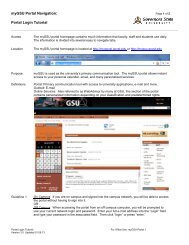Master of Occupational Therapy Program - Governors State University
Master of Occupational Therapy Program - Governors State University
Master of Occupational Therapy Program - Governors State University
You also want an ePaper? Increase the reach of your titles
YUMPU automatically turns print PDFs into web optimized ePapers that Google loves.
<strong>Occupational</strong> <strong>Therapy</strong> Code <strong>of</strong> Ethics and Ethics Standards (2010)<br />
PREAMBLE<br />
The American <strong>Occupational</strong> <strong>Therapy</strong> Association (AOTA) <strong>Occupational</strong> <strong>Therapy</strong> Code <strong>of</strong> Ethics<br />
and Ethics Standards (2010) (“Code and Ethics Standards”) is a public statement <strong>of</strong> principles<br />
used to promote and maintain high standards <strong>of</strong> conduct within the pr<strong>of</strong>ession. Members <strong>of</strong><br />
AOTA are committed to promoting inclusion, diversity, independence, and safety for all<br />
recipients in various stages <strong>of</strong> life, health, and illness and to empower all beneficiaries <strong>of</strong><br />
occupational therapy. This commitment extends beyond service recipients to include<br />
pr<strong>of</strong>essional colleagues, students, educators, businesses, and the community.<br />
Fundamental to the mission <strong>of</strong> the occupational therapy pr<strong>of</strong>ession is the therapeutic use <strong>of</strong><br />
everyday life activities (occupations) with individuals or groups for the purpose <strong>of</strong> participation<br />
in roles and situations in home, school, workplace, community, and other settings.<br />
“<strong>Occupational</strong> therapy addresses the physical, cognitive, psychosocial, sensory, and other aspects<br />
<strong>of</strong> performance in a variety <strong>of</strong> contexts to support engagement in everyday life activities that<br />
affect health, well being, and quality <strong>of</strong> life” AOTA, 2004). <strong>Occupational</strong> therapy personnel<br />
have an ethical responsibility primarily to recipients <strong>of</strong> service and secondarily to society.<br />
The <strong>Occupational</strong> <strong>Therapy</strong> Code <strong>of</strong> Ethics and Ethics Standards (2010) was tailored to address<br />
the most prevalent ethical concerns <strong>of</strong> the pr<strong>of</strong>ession in education, research, and practice. The<br />
concerns <strong>of</strong> stakeholders including the public, consumers, students, colleagues, employers,<br />
research participants, researchers, educators, and practitioners were addressed in the creation <strong>of</strong><br />
this document. A review <strong>of</strong> issues raised in ethics cases, member questions related to ethics, and<br />
content <strong>of</strong> other pr<strong>of</strong>essional codes <strong>of</strong> ethics were utilized to ensure that the revised document is<br />
applicable to occupational therapists, occupational therapy assistants, and students in all roles.<br />
The historical foundation <strong>of</strong> this Code and Ethics Standards is based on ethical reasoning<br />
surrounding practice and pr<strong>of</strong>essional issues, as well as on empathic reflection regarding these<br />
interactions with others (see e.g., AOTA, 2005, 2006). This reflection resulted in the<br />
establishment <strong>of</strong> principles that guide ethical action, which goes beyond rote following <strong>of</strong> rules<br />
or application <strong>of</strong> principles. Rather, ethical action is a manifestation <strong>of</strong> moral character and<br />
mindful reflection. It is a commitment to benefit others, to virtuous practice <strong>of</strong> artistry and<br />
science, to genuinely good behaviors, and to noble acts <strong>of</strong> courage.<br />
While much has changed over the course <strong>of</strong> the pr<strong>of</strong>ession’s history, more has remained the<br />
same. The pr<strong>of</strong>ession <strong>of</strong> occupational therapy remains grounded in seven core concepts, as<br />
identified in the Core Values and Attitudes <strong>of</strong> <strong>Occupational</strong> <strong>Therapy</strong> Practice (AOTA, 1993):<br />
altruism, equality, freedom, justice, dignity, truth, and prudence. Altruism is the individual’s<br />
ability to place the needs <strong>of</strong> others before their own. Equality refers to the desire to promote<br />
fairness in interactions with others. The concept <strong>of</strong> freedom and personal choice is paramount in<br />
a pr<strong>of</strong>ession in which the desires <strong>of</strong> the client must guide our interventions. <strong>Occupational</strong> therapy<br />
practitioners, educators, and researchers relate in a fair and impartial manner to individuals with<br />
whom they interact and respect and adhere to the applicable laws and standards regarding their<br />
area <strong>of</strong> practice, be it direct care, education, or research (justice). Inherent in the practice <strong>of</strong><br />
1





